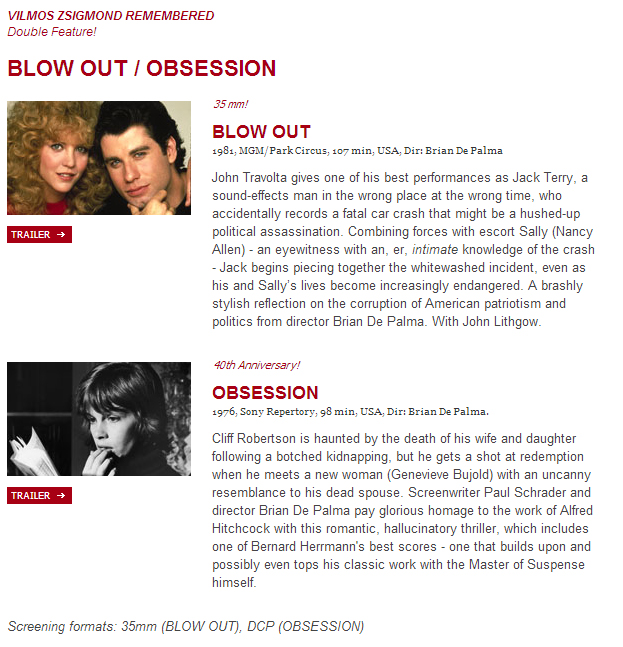 Hello and welcome to the unofficial Brian De Palma website. Here is the latest news: |
|---|
 Hello and welcome to the unofficial Brian De Palma website. Here is the latest news: |
|---|
E-mail
Geoffsongs@aol.com
-------------
Recent Headlines
a la Mod:
Listen to
Donaggio's full score
for Domino online
De Palma/Lehman
rapport at work
in Snakes
De Palma/Lehman
next novel is Terry
De Palma developing
Catch And Kill,
"a horror movie
based on real things
that have happened
in the news"
Supercut video
of De Palma's films
edited by Carl Rodrigue
Washington Post
review of Keesey book
-------------
Exclusive Passion
Interviews:
Brian De Palma
Karoline Herfurth
Leila Rozario
------------
------------
| « | February 2016 | » | ||||
| S | M | T | W | T | F | S |
| 1 | 2 | 3 | 4 | 5 | 6 | |
| 7 | 8 | 9 | 10 | 11 | 12 | 13 |
| 14 | 15 | 16 | 17 | 18 | 19 | 20 |
| 21 | 22 | 23 | 24 | 25 | 26 | 27 |
| 28 | 29 | |||||
De Palma interviewed
in Paris 2002
De Palma discusses
The Black Dahlia 2006

Enthusiasms...
Alfred Hitchcock
The Master Of Suspense
Sergio Leone
and the Infield
Fly Rule
The Filmmaker Who
Came In From The Cold
Jim Emerson on
Greetings & Hi, Mom!
Scarface: Make Way
For The Bad Guy
Deborah Shelton
Official Web Site
Welcome to the
Offices of Death Records
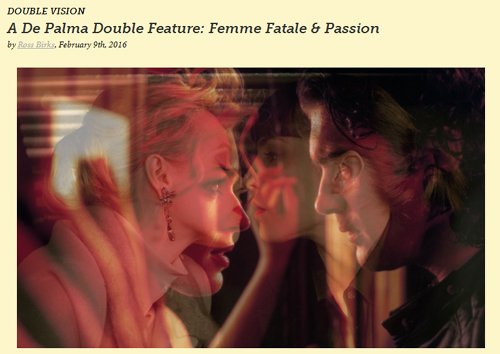 Dim The House Lights began an “occasional column” this week called “Double Vision,” and the second installment finds Ross Birks linking Brian De Palma’s Femme Fatale with his most recent feature, Passion. “If you’re going to pair up two Brian De Palma erotic thrillers,” Birks writes, “nine times out of ten you’d go for Dressed to Kill and Body Double. Upon recently revisiting De Palma’s canon for the umpteenth time, however, I found a better pairing: Femme Fatale and Passion. Made ten years apart these two films showcase a late-career De Palma returning to the genre he helped define with a newfound enthusiasm and experimentation."
Dim The House Lights began an “occasional column” this week called “Double Vision,” and the second installment finds Ross Birks linking Brian De Palma’s Femme Fatale with his most recent feature, Passion. “If you’re going to pair up two Brian De Palma erotic thrillers,” Birks writes, “nine times out of ten you’d go for Dressed to Kill and Body Double. Upon recently revisiting De Palma’s canon for the umpteenth time, however, I found a better pairing: Femme Fatale and Passion. Made ten years apart these two films showcase a late-career De Palma returning to the genre he helped define with a newfound enthusiasm and experimentation."While Birks does not leave out mention of the use of dreams in De Palma's previous films, his focus on these three actually makes for an intriguing trilogy, each conveniently ten years apart (it is an odd recent phenomenon that a movie's film festival screening year has become its official year of release: Passion, which played several fests in 2012 but was not officially released in any country until 2013, is referred to in most cases, even the IMDB, as a 2012 film). Each of the three feature long, extended dream sequences in the middle of the film. The dream at the center of Femme Fatale is clearly delineated, yet the whole film comes to seem marked by a transcendent sort of dream logic that feels sprung from multiple dreamers. As such, it does make for a graceful centerpiece in a trilogy that would keep any audience on its toes, as the nightmares from Raising Cain and Passion keep the viewer guessing what is dream, what is real, and by the way, whose dream are we in now?
Birks continues, "Passion‘s centerpiece, at least from a De Palma obsessive’s point of view, is an extended split screen sequence that intercuts a ballet performance with a stealthy murder in the giallo tradition and culminates with Isabelle jolting awake in her bed just as Christine (McAdams) has her throat slashed open. For a time, it isn’t clear if the previous scene really occurred or was just a variation of what actually transpired. From then on the film becomes hyper-real, bathed in expressionistic shadows and Dutch camera angles that are at odds stylistically with the film’s rather composed first hour. Even the story becomes excessively nonsensical with twist piling on after twist to the point of absurdity. The 'it was all a dream' trope has become one of the most groan-worthy in cinema so De Palma’s commitment to it in both Passion and Femme Fatale is all the more daring and admirable. It’s as if he saw utilizing that twist as a challenge in itself and wanted to explore the possibilities. Perhaps if he was subtler about it audiences would have been more receptive (see Mulholland Dr.) but De Palma has never been about subtlety, which is actually one of things I respond to most in his work."
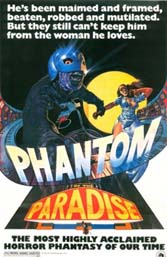 Cinematary, a weekly movie podcast, begins a series on Brian De Palma with this week's episode. The second half of the hour-long episode features Zach, Dylan, Lydia, and Nathan discussing Phantom Of The Paradise. All but one of the four watched De Palma's film for the first time in preparation for the discussion. The discussion is worth listening to, as it becomes quickly apparent that the participants have a smart, invested interest in cinema. While it is disappointing to hear two of them agree in the wrap-up that De Palma "tries" to cram too much into this film, they also have the insight to note that Phantom seems socially and culturally aware of the time in which it was made. At one point, one of the participants states that the thing about De Palma is, "the more you see his movies, the more everything makes sense."
Cinematary, a weekly movie podcast, begins a series on Brian De Palma with this week's episode. The second half of the hour-long episode features Zach, Dylan, Lydia, and Nathan discussing Phantom Of The Paradise. All but one of the four watched De Palma's film for the first time in preparation for the discussion. The discussion is worth listening to, as it becomes quickly apparent that the participants have a smart, invested interest in cinema. While it is disappointing to hear two of them agree in the wrap-up that De Palma "tries" to cram too much into this film, they also have the insight to note that Phantom seems socially and culturally aware of the time in which it was made. At one point, one of the participants states that the thing about De Palma is, "the more you see his movies, the more everything makes sense."
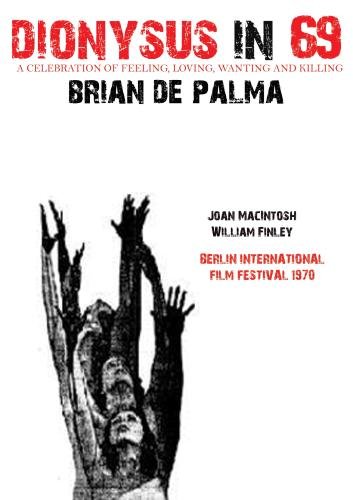 Today at Every '70s Movie, Peter Hanson looks at Dionysus In '69. "Experimental theater being what it is," Hanson begins, "any document of this offbeat genre is sure to divide audiences. As such, something like Dionysus in ’69 can’t be appraised in only one way. Those with adventurous spirits and an eagerness to see postmodern rethinks of longstanding storytelling conventions will be able to appreciate Dionysus in ’69 as a form of artistic exploration. Concurrently, those who enjoy understanding what the hell they’re watching will lose patience quickly. Even those who seek out Dionysus in ’69 because of Brian De Palma’s involvement are likely to be confounded. The picture has a couple of significant connections to the director’s later work, but he didn’t conceive or singlehandedly helm the piece, [and] the execution is avant-garde in the extreme."
Today at Every '70s Movie, Peter Hanson looks at Dionysus In '69. "Experimental theater being what it is," Hanson begins, "any document of this offbeat genre is sure to divide audiences. As such, something like Dionysus in ’69 can’t be appraised in only one way. Those with adventurous spirits and an eagerness to see postmodern rethinks of longstanding storytelling conventions will be able to appreciate Dionysus in ’69 as a form of artistic exploration. Concurrently, those who enjoy understanding what the hell they’re watching will lose patience quickly. Even those who seek out Dionysus in ’69 because of Brian De Palma’s involvement are likely to be confounded. The picture has a couple of significant connections to the director’s later work, but he didn’t conceive or singlehandedly helm the piece, [and] the execution is avant-garde in the extreme."
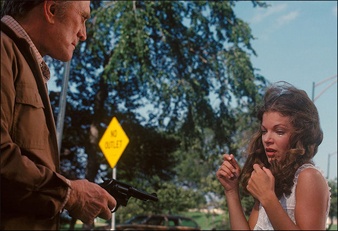 Brian De Palma's The Fury is now available to watch on Netflix Streaming, as well as on Amazon, iTunes, Vudu, Google Play, and YouTube. Fangoria's Ken W. Hanley writes about the film in a column called "Crossing Over," which looks at films and series that are not considered part of the horror genre, yet have undeniable elements of horror, all the same. "To be honest," writes Hanley, "this writer heavily debated featuring this film for this particular column because on many levels, The Fury is a horror film. With make-up FX from Rick Baker, a post-Carrie Brian De Palma and an tension-ramping score from John Williams, The Fury has some truly shocking moments of bloody insanity throughout. And yet with all the aspects of action, mystery and political thriller strewn throughout, the horror of The Fury often becomes a footnote in the film’s legacy, which is a damn shame."
Brian De Palma's The Fury is now available to watch on Netflix Streaming, as well as on Amazon, iTunes, Vudu, Google Play, and YouTube. Fangoria's Ken W. Hanley writes about the film in a column called "Crossing Over," which looks at films and series that are not considered part of the horror genre, yet have undeniable elements of horror, all the same. "To be honest," writes Hanley, "this writer heavily debated featuring this film for this particular column because on many levels, The Fury is a horror film. With make-up FX from Rick Baker, a post-Carrie Brian De Palma and an tension-ramping score from John Williams, The Fury has some truly shocking moments of bloody insanity throughout. And yet with all the aspects of action, mystery and political thriller strewn throughout, the horror of The Fury often becomes a footnote in the film’s legacy, which is a damn shame."


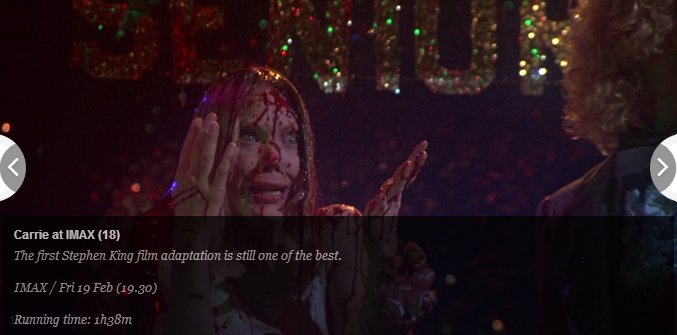
Two of the other four films in the Glasgow "Anniversaries at IMAX" series are James Cameron's Aliens and Tony Scott's Top Gun, both released in 1986. A 1996 film will be voted on and chosen by readers of The List from among three candidates: From Dusk Till Dawn, Scream, and Trainspotting.
